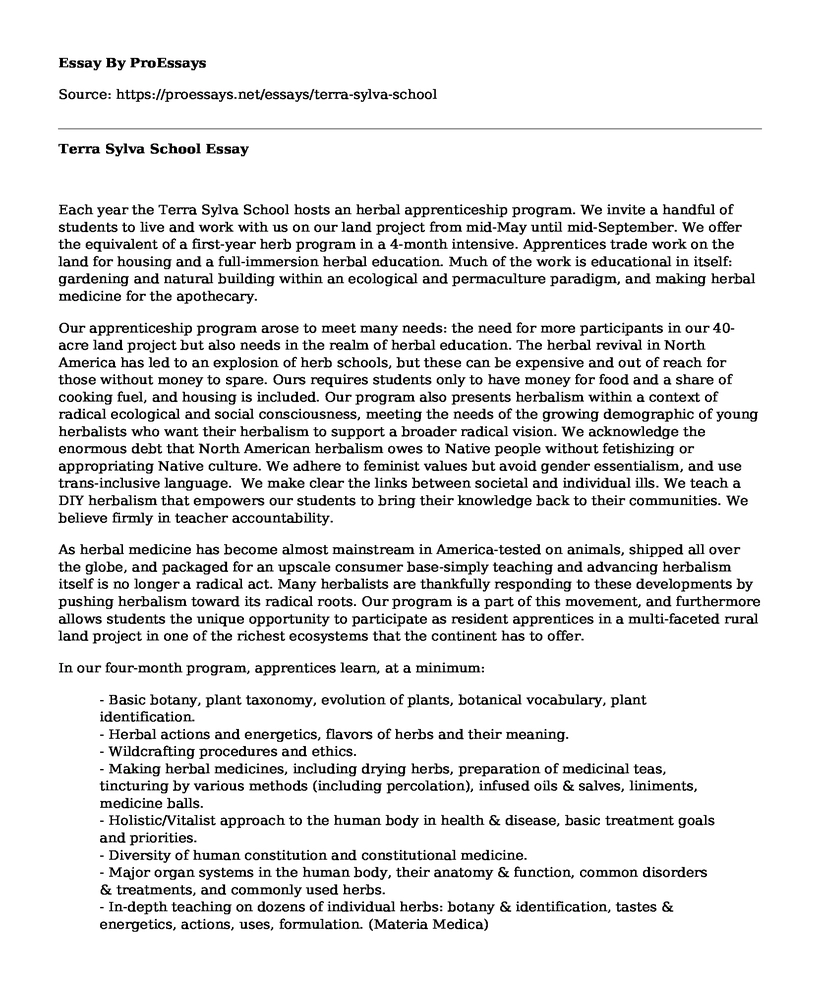Each year the Terra Sylva School hosts an herbal apprenticeship program. We invite a handful of students to live and work with us on our land project from mid-May until mid-September. We offer the equivalent of a first-year herb program in a 4-month intensive. Apprentices trade work on the land for housing and a full-immersion herbal education. Much of the work is educational in itself: gardening and natural building within an ecological and permaculture paradigm, and making herbal medicine for the apothecary.
Our apprenticeship program arose to meet many needs: the need for more participants in our 40-acre land project but also needs in the realm of herbal education. The herbal revival in North America has led to an explosion of herb schools, but these can be expensive and out of reach for those without money to spare. Ours requires students only to have money for food and a share of cooking fuel, and housing is included. Our program also presents herbalism within a context of radical ecological and social consciousness, meeting the needs of the growing demographic of young herbalists who want their herbalism to support a broader radical vision. We acknowledge the enormous debt that North American herbalism owes to Native people without fetishizing or appropriating Native culture. We adhere to feminist values but avoid gender essentialism, and use trans-inclusive language. We make clear the links between societal and individual ills. We teach a DIY herbalism that empowers our students to bring their knowledge back to their communities. We believe firmly in teacher accountability.
As herbal medicine has become almost mainstream in America-tested on animals, shipped all over the globe, and packaged for an upscale consumer base-simply teaching and advancing herbalism itself is no longer a radical act. Many herbalists are thankfully responding to these developments by pushing herbalism toward its radical roots. Our program is a part of this movement, and furthermore allows students the unique opportunity to participate as resident apprentices in a multi-faceted rural land project in one of the richest ecosystems that the continent has to offer.
In our four-month program, apprentices learn, at a minimum:
- Basic botany, plant taxonomy, evolution of plants, botanical vocabulary, plant identification.- Herbal actions and energetics, flavors of herbs and their meaning.- Wildcrafting procedures and ethics.- Making herbal medicines, including drying herbs, preparation of medicinal teas, tincturing by various methods (including percolation), infused oils & salves, liniments, medicine balls.- Holistic/Vitalist approach to the human body in health & disease, basic treatment goals and priorities.- Diversity of human constitution and constitutional medicine.- Major organ systems in the human body, their anatomy & function, common disorders & treatments, and commonly used herbs.- In-depth teaching on dozens of individual herbs: botany & identification, tastes & energetics, actions, uses, formulation. (Materia Medica)- Making herbal formulas.- Basic clinical skills: Interview, assessment, setting priorities, treatment strategies.
Plant walks are a regular feature, where we visit & interact with plants growing in the wild or in the garden. The teaching in general leans heavily on experience: being with the plants, harvesting herbs, making medicine, tasting and noticing the actions of herbs, listening to the body.
Cite this page
Terra Sylva School. (2021, Nov 12). Retrieved from https://proessays.net/essays/terra-sylva-school
If you are the original author of this essay and no longer wish to have it published on the ProEssays website, please click below to request its removal:
- Report Example on Food Processing Plant Hygiene
- Essay Sample on Pros and Cons of Vaccinations
- Paper Example on Ethical Theories in Nursing
- Admission Essay Sample on Master's Program on Nursing
- Essay Sample on Pharma Industry: Stereotypes & Stakeholder Perceptions
- Essay Example on Perineal Care: Prevent Burning, Odour & Itching Infections
- 65-yo Woman, Bronchial Asthma, Severe Allergy: Moderate Persistent Asthma - Essay Sample







